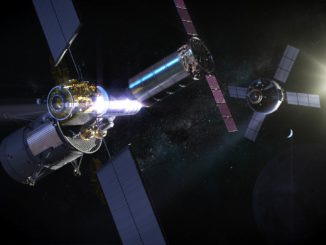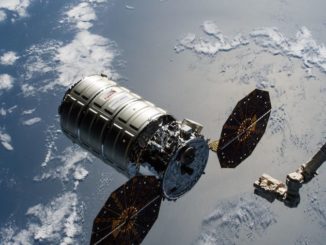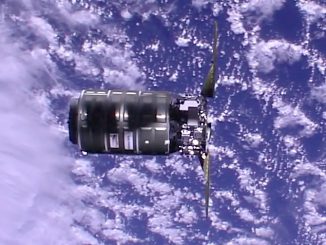
Orbital Sciences Corp. is set to launch its next commercial resupply flight to the International Space Station on Monday after inspections revealed a rocket tracking station in Bermuda weathered a direct hit from Hurricane Gonzalo last week.
Liftoff of Orbital’s third commercial cargo flight to the orbiting research laboratory is set for 6:45 p.m. EDT (2245 GMT) Monday from launch pad 0A at the Mid-Atlantic Regional Spaceport at Wallops Island, Va.
A two-stage Antares launcher — with Orbital’s Cygnus cargo carrier enshrouded in its nose — is scheduled for rollout from a horizontal rocket integration hangar to pad 0A on Friday, officials said Wednesday.
The Antares rocket will ride horizontally on a self-propelled mobile transporter for the one-mile trip from the horizontal integration facility to the launch pad. Hydraulic pistons will rotate the Antares booster and Cygnus cargo craft vertical on top of the pad’s launch mount, and technicians will make final electrical and fluid connections between the rocket and the launch pad.
“The Cygnus spacecraft is fully fueled and loaded with most of its cargo bound for the ISS and has been mated with the Antares rocket that will launch it into low Earth orbit,” Orbital Sciences said in an update Wednesday. “The remaining time-sensitive ‘final load’ cargo will be placed onboard tomorrow, prior to fairing encapsulation, which is also scheduled for tomorrow (Thursday).”
The launch was delayed from Friday as Hurricane Gonzalo approached Bermuda, the home of a tracking facility required to receive telemetry from the Antares rocket as it accelerates into orbit over the Atlantic Ocean.
Hurricane Gonzalo’s eye passed over Bermuda late Oct. 17 as a Category 2 storm, bringing damaging winds, battering waves and heavy rains to the British island territory.
Workers secured the communications equipment before the hurricane’s arrival and returned this week to bring the tracking station back online.

Orbital and NASA set Monday as the target launch date for the cargo mission after an inspection of the Bermuda tracking station.
The automated Cygnus supply ship will separate from the Antares rocket’s second stage about 10 minutes after liftoff, deploy its electricity-generating solar panels and begin a series of thruster burns to catch up with the space station.
Officials opted to schedule the Antares launch earlier than necessary for the Cygnus spacecraft’s Nov. 2 docking opportunity, choosing to give the launch team multiple launch attempts and still preserve an on-time arrival at the space station.
The Cygnus spacecraft will approach the football field-sized station Nov. 2, carefully flying within 30 feet of the complex as astronauts take control of the lab’s robotic arm to reach out and capture the cargo capsule.
A Russian Progress supply ship is set for launch Oct. 29 from the Baikonur Cosmodrome in Kazakhstan, with docking to the space station expected about six hours later, precluding Orbital’s cargo capsule from getting to the complex within two days of launch — the normal schedule for logistics flights operated by Orbital Sciences and SpaceX.
The flight is Orbital’s third logistics mission to the space station. Known as Orb-3, the mission follows Orbital Sciences cargo launches in January and July, and a test flight to the station in 2013. The company has five more resupply flights under contract with NASA.
The Orb-3 Cygnus spacecraft — dubbed the SS Deke Slayton after the Mercury astronaut and a trailblazer in commercial spaceflight — will carry about 5,050 pounds of experiments, supplies, food and other cargo to the space station.
It will stay attached to the space station until early December, when it will depart and drop back into Earth’s atmosphere to burn up and dispose of trash.
The Oct. 27 launch will incorporate an upgraded Castor 30XL upper stage on the Antares rocket, giving the launcher a capability to lift heavier spacecraft — and more space station-bound cargo — into orbit.
Built by ATK, the solid-fueled Castor 30XL motor is longer than the Castor 30 stages flown on the Antares rocket’s four previous missions, allowing Orbital to carry up more than 1,000 extra pounds of cargo to the space station.
Orbital plans to introduce enhancements to its Cygnus spacecraft on the company’s next resupply flight next spring, including a larger cargo module, a new circular solar array design, and lighter structural materials.
The upgrades will allow Cygnus to haul nearly three tons of supplies to the space station.



